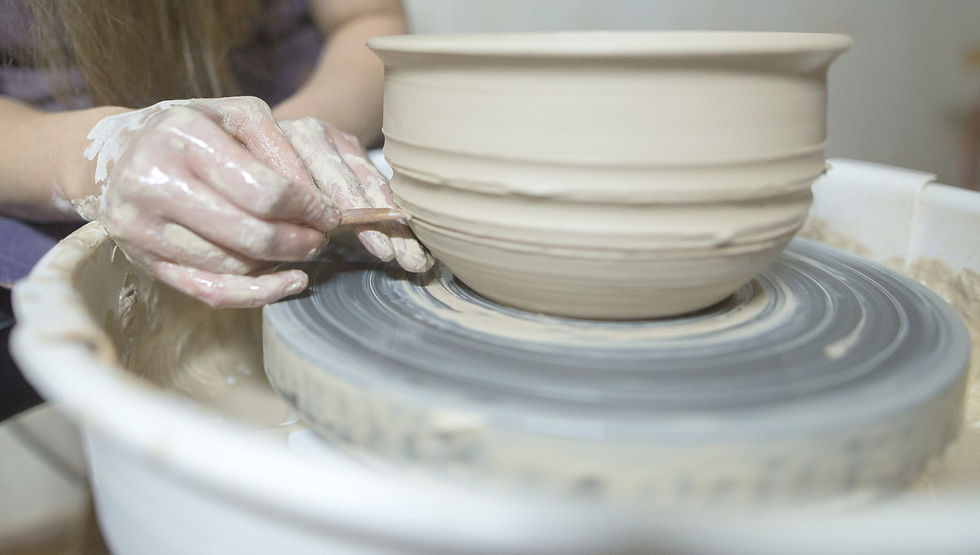How to Choose the Perfect Pottery Wheel for Your Studio
- Efthymios Sifounios

- Feb 19, 2023
- 3 min read
A reliable pottery wheel is essential for ceramists looking to produce professional quality work. Before you buy, however, it's necessary to understand what options are available and which type of wheel best fits your needs.
This article will discuss electric, kick, and manual wheels, their advantages and disadvantages, and factors you should consider before purchasing.
Types of Pottery Wheels
Here are some types of Pottery Wheels
I. Electric Pottery Wheels
Electric pottery wheels offer convenience and ease of use thanks to their automated controls. They typically have adjustable speed settings that allow you to move from slow speeds suitable for shaping clay to faster speeds used for trimming or finishing pieces.
One downside is they usually require more space than manual wheels due to their larger motors and splash pans. When shopping for an electric wheel, consider its size, cost, features (such as speed controls or reversibility), and user experience (comfortability level).

II. Kick Wheels
Kick wheels offer traditional working methods with clay without electric power or other mechanical energy sources. These lightweight devices are smaller than electric versions but still provide excellent control over larger pieces or slabs. While they often don't offer the same speed settings as electric models, they provide good consistency since each turn must be turned by hand.
Additionally, kick wheels are affordable compared with electric models. Still, they may be less durable over time due to their lack of mechanical parts such as belts or motors.
III. Manual Pottery Wheels
Manual pottery wheels may be ideal if portability is essential since many versions weigh less than 25 pounds and can easily fit in cars or planes. This wheel type also requires no power source, so they come in handy if you're working outdoors projects where electricity isn't available in remote locations like beaches or mountain cabins!
Manuals have some limitations - they don't have speed control capabilities like electric ones, nor do they offer automatic reversing capabilities when needed, making delicate work more complex depending on the task. They also tend to hold up less under heavy usage, so keep that in mind if you anticipate needing a lot of production output from your wheel!
Factors To Consider When Choosing A Pottery Wheel
It's essential to consider several factors before investing in a new wheel. Here are some factors To consider when choosing a pottery wheel
I. Size:
The wheel head diameter is essential when selecting which wheel to invest in. It will determine the speed and power of the machine.
II. Cost:
When selecting a wheel, budgeting for upfront costs and potential long-term operations costs is vital.
III. Features:
Consideration should be given to features such as speed control, reversibility, and noise level.
IV. User Experience:
Consider your experience when selecting a wheel - comfort, durability, and ease of use are all critical considerations.
V. Type of Wheel:
Knowing how much help you want from your machine will help determine whether an electric or manual wheel is best suited for your needs - Electric boasts higher productivity rates. In contrast, the manual provides greater portability and often lighter-weight designs.
Tips For Choosing The Right Pottery Wheel For Your Studio
Ultimately selecting the perfect wheel for your studio will depend on understanding what you need from it - Here are some essential tips:
Determine Your Needs - Identity what kind of projects you plan on working on most frequently & research which type offers advantages that match those goals;
Do Your Research - Check out industry forums & reviews online;
Consider Budget – factor in costs like shipping & hidden expenses that may come up;
Try Before You Buy – visit local stores & see how different ones feel when playing with them before committing!
Conclusion
Choosing the perfect pottery wheel for your studio doesn't have to be overly complicated - Know what kind of projects you'll be doing most often & factor in all relevant considerations before making a purchase decision! With these tips in mind, we hope you find exactly what you're looking for - Happy Shopping!
If you want to find out more about Pottery https://www.sifouniospottery.com/


Comments